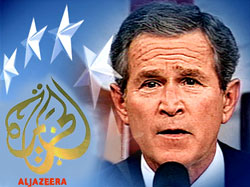A new weapon in the “Global War of Ideas”
By Ehsan Ahrari-Guest Columnist- | Last updated: May 29, 2006 - 11:08:00 AM
What's your opinion on this article?

Al Jazeera's logo
From the perspectives of the Bush administration, the most troubling part of al-Jazeeras coverage was that the American audience became increasingly aware of the "anti-American bias" of that channel, and how much the U.S. officials felt constrained and frustrated about not being able to counter it. The only difference was that up until now, most Americans did not actually see or hear the al-Jazeera coverage first hand. Now they are about to get that coverage in their living rooms. Consequently, the international coverage of battlefields will unquestionably undergo profound changes. |
When al-Jazeera was established in 1996, no one had even heard of the phrase, “war of ideas” in the context of the world of Islam. It was established to give the Arab world Arab perspectives on major issues of global affairs. That idea became quite profound in the aftermath of the terrorist attacks of September 11, 2001, on the United States. During the post-9/11 era, a lot of ink has been spilled (or to put it in the context of the information age, thousands of keyboards have been pounded) on the subject of war of ideas. However, a big chunk of the material under that rubric was being created in the United States. Now this war is about to acquire a global dimension. Everyone—French, Germans and Arabs television—is getting involved. But it is al-Jazeera’s upcoming worldwide English channel that is going to revolutionize this global “battlefield” of ideas.
When the Bush administration went into Afghanistan, it got the taste of how an Arab information medium, al-Jazeera, would spin the coverage of the battle in that country. Needless to say, it did not like al-Jazeera’s coverage, which was instantly dubbed as “anti-American,” “heavily biased,” and even “pro-Taliban or al-Qaida.”
Everyone likes to talk about the globalization of information revolution, but that revolution has been very slow in coming in the sphere of news coverage, especially the television version of it. The world thus far has been under the oligopoly between the BBC and the CNN in terms of international coverage of news. According to Der Spiegel, the BBC World reaches 279 million households in 200 countries, while the CNN International reaches 200 million households in 200 countries. Compared to these two channels, even German and French news media are just starting, since they have very small shares global audience market. This monopoly of English language coverage of the news provides the United States and the U.K. an inordinate amount of leverage in news selection, and, more important, in propagating the government spins on all issues of global import and interest.

Televisora del Sur (Spanish for "Television Station of the South"), named teleSUR, is a pan-Latin American television network based in Caracas, Venezuela . It began full-time broadcasts on October 31, 2005. Proposed by Venezuelan President Hugo Chávez, teleSUR is intended to be a counterweight to the globally dominant media conglomerates such as CNN and BBC.
|
Consequently, long presidential or Prime Ministerial press conferences or lengthy coverage of major news events present the U.S. and British perspectives to the American and British and even world audience. But the foreign perspectives on those very same events are offered on a summarized basis. What is also not stated is that the inordinate amount of tilt that is wittingly or unwittingly provided for the U.S. or U.K. perspectives, simply by covering them so extensively. That automatically creates a bias in the reporting of news.
In the coverage of news, the notion of objectivity requires that the views of both sides be presented. However, by presenting “both” sides of a story, there is still ample room for editorializing by the journalist who is covering the story. Besides, being an American or British new media, there is that natural inclination to be sympathetic to your own country’s perspectives. That is only a human predilection.
That reality was never clearer than during the post-9/11 era, and especially during the American invasion of Afghanistan and Iraq. The U.S. Department of Defense required that all journalists should be “embedded,” which became a euphemism for attaching them to various military units and making sure they don’t talk about things that would jeopardize military operations. At least on surface, that is a reasonable rule, but the military used it to present predominantly the U.S. perspectives during both wars. The controversial aspect of that entire issue was that al-Jazeera journalists could not be forced to abide by those rules in Afghanistan, at least until the dismantlement of the Taliban rule. However, during the Iraqi campaign, especially after the toppling of the regime of Saddam Hussein, the Al-Jazeera coverage could not remain that independent.
One correspondent from al-Jazeera made a very interesting observation about the Bush administration’s decision to embed the journalists. He said, by embedding the journalists, the U.S. military provides them a good coverage from the front side of a military operation, but never from its backside. What he was saying was that the frontal coverage never presents its viewers the destruction, blood and gore related to war that the backside coverage of it does.
In embedding the journalists to military units, the U.S. military could also ensure that the American version of what is transpiring in a theater should be provided not only to the American audience, but also to the global audience. Al Jazeera changed all that, if not that much from the military theaters, certainly from a wider angle inside Afghanistan and Iraq.

US President George Bush planned to bomb Aljazeera, British newspaper the Daily Mirror has reported, citing a Downing Street memo marked top secret.
|
Al-Jazeera and Al-Arabiyya, another Arab channel, were determined to provide the Arab and Muslim perspectives on the news. So, the coverage of the Intifada that started in September 2000 was done with a keen interest to underscore the Palestinian suffering. Al-Jazeera seems to have a corner in terms of getting the propaganda tapes from al-Qaida. At first, it televised those tapes in their entirety. However, under severe American criticism that Usama Bin Laden might be sending secret messages through the use of steganography—i.e., the art and science of writing hidden messages in such a way that no one apart from the intended recipient knows of the existence of such message—al-Jazeera decided to air summaries of those tapes.
As al-Jazeera’s English telecast goes global, there will be a true “war of ideas” from the West and from the world of Islam. One can be rest assured that there is likely to be a global Islamic channel in the near future from Saudi Arabia, Malaysia, or Indonesia. Such a channel would couch the entire debate of war of ideas in the Islamic context, as opposed to al-Jazeera, which will maintain its Arab slant on the news.
Now there is ample reason to feel optimistic that the Arab and Muslim audience will have an opportunity to compare daily news, compare perspectives, and slants from the East as well as the West. Through such comparisons they would learn a lot about how much substance there is when the U.S. says that it has no quarrel with Islam. By the same token, they would be exposed to inadequacies of the tyrannies under which they have been living. Such a visualization on a daily basis is likely to, in the not-too-distant future, bring an end to those systems that should have been thrown into the dustbin of history decades ago.
The globalization of the war of ideas would pose the same type of challenges to the United States as the onslaught of democracy in a non-democratic polity. The United States will have to compete very hard on a global scale in order to promote its own version of reality and truth. Now the war of ideas will be truly democratic in the sense that there is likely to be an open competition between those who are packagaging their information well but are lying, and those who are telling the truth, which might be ugly but is still reflecting reality.
Ehsan Ahrari is the CEO of Strategic Paradigms Defense Consultancy based in Alexandria, VA, US. His columns appear regularly in Asia Times Online. He is also the USA Editor of World Security Network Online (WSN), and a regular contributor to the Global Beat Syndicate. He can be reached at: [email protected] or [email protected].
INSIDE STORIES AND REVIEWS
-
-
About Harriett ... and the Negro Hollywood Road Show
By Rabiah Muhammad, Guest Columnist » Full Story -
Skepticism greets Jay-Z, NFL talk of inspiring change
By Bryan 18X Crawford and Richard B. Muhammad The Final Call Newspaper @TheFinalCall » Full Story -
The painful problem of Black girls and suicide
By Charlene Muhammad -National Correspondent- » Full Story -
Exploitation of Innocence - Report: Perceptions, policies hurting Black girls
By Charlene Muhammad -National Correspondent- » Full Story -
Big Ballin: Big ideas fuel a father’s Big Baller Brand and brash business sense
By Bryan Crawford -Contributing Writer- » Full Story






 Click Here Stay Connected!
Click Here Stay Connected!








